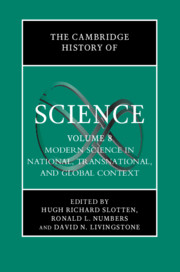Book contents
- The Cambridge History of Science
- The Cambridge History of Science
- The Cambridge History Of Science
- Copyright page
- Contents
- Notes on Contributors
- General Editors’ Preface
- 1 Introduction
- Part I Transnational, International, and Global
- 2 Science and Imperialism since 1870
- 3 The Geomagnetic Project: Internationalism in Science between the French Revolution and the Franco-Prussian War
- 4 International Science from the Franco-Prussian War to World War Two: An Era of Organization
- 5 Internationalism in Science After 1940
- 6 International Science in Antarctica
- 7 Missionary Science
- 8 Museums of Natural History and Science
- 9 National Scientific Surveys
- 10 Expeditionary Science
- Part II National and Regional
- Index
8 - Museums of Natural History and Science
from Part I - Transnational, International, and Global
Published online by Cambridge University Press: 21 March 2020
- The Cambridge History of Science
- The Cambridge History of Science
- The Cambridge History Of Science
- Copyright page
- Contents
- Notes on Contributors
- General Editors’ Preface
- 1 Introduction
- Part I Transnational, International, and Global
- 2 Science and Imperialism since 1870
- 3 The Geomagnetic Project: Internationalism in Science between the French Revolution and the Franco-Prussian War
- 4 International Science from the Franco-Prussian War to World War Two: An Era of Organization
- 5 Internationalism in Science After 1940
- 6 International Science in Antarctica
- 7 Missionary Science
- 8 Museums of Natural History and Science
- 9 National Scientific Surveys
- 10 Expeditionary Science
- Part II National and Regional
- Index
Summary
Museums of natural history play a significant role in interpreting the natural world in scientific terms. They are sites where initially taxonomic, then geographic, and more recently environmental emphases have been reflected in their holdings and displays. Several issues frame their history: what individual museums hold; how objects are acquired; which material artifacts are displayed and in what arrangement; what audience observes them and for what purposes; and who sponsors museum activities. Cultural historians are particularly interested in museums as places that elaborate meaning through material objects on display, paying particular attention when interpretation is contested. Museum historians have traced the work of curators who developed and extended systematics within the natural sciences.
- Type
- Chapter
- Information
- The Cambridge History of Science , pp. 108 - 123Publisher: Cambridge University PressPrint publication year: 2020
- 1
- Cited by



